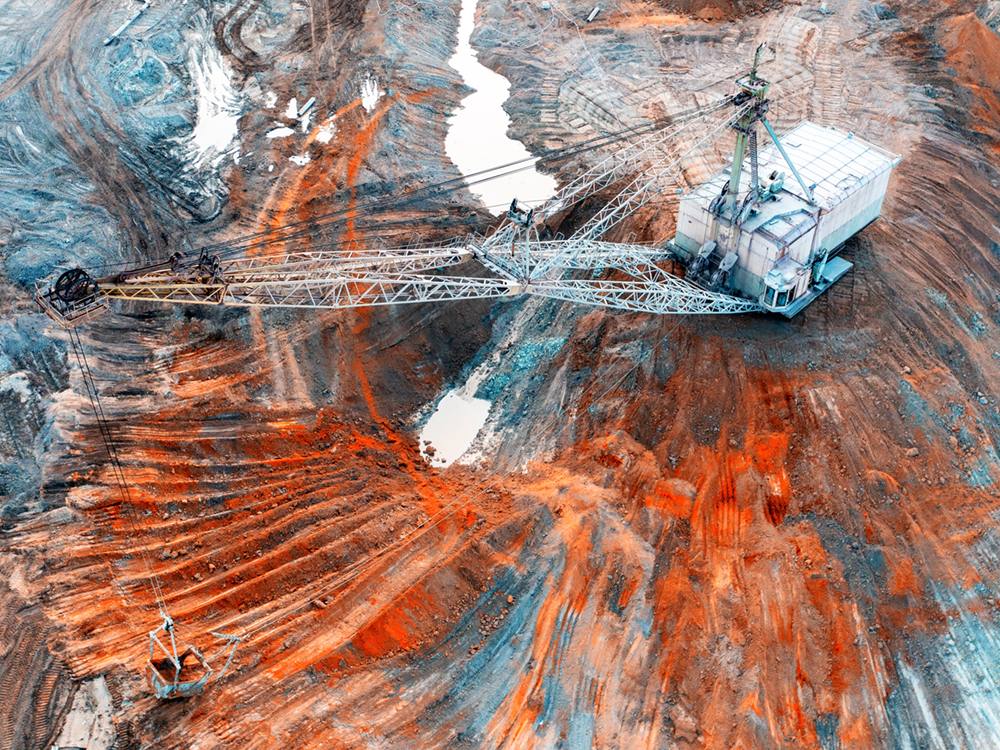The best intentions in the world will not stop the inertia of a heavy civilization that is rolling on its way. — poet Gary Snyder
In a recent essay I argued that replacing a 150-year-old fossil fuel system with a shiny electrical one in just 25 years to address climate chaos would come with monstrous ecological costs.
I also said it won’t get the job done given that climate change is just one symptom of a greater crisis: the excessive consumption of resources on a finite planet. You had to read deep into the essay to arrive at what I proposed we must do instead of embracing “clean tech” as the blessed saviour.
So let me put it straight here at the top, before I elaborate later: Any imperfect solution to our current civilization-threatening predicament must include dialing down our energy consumption rather than coming up with high-tech visions that keep accelerating it.
And that means reasserting human control over the technosphere now fragmenting us and imposing real limits on the algorithmic conquest of our thinking.
Grandiose dreams built on irony and paradox
In my article I summarized the work of geologists, journalists, physicists and energy experts — including Simon Michaux, Siddharth Kara, Vaclav Smil, Guillaume Pitron, Alice Friedemann, Nate Hagens and Tom Murphy — who have done the critical math. The ecologist William Rees, the physicist Antonio Turiel and oil analyst Art Berman also have all made important contributions to this conversation.
Their calculations, which respect biophysical realities and limits, show that humans will have to mine more metals and minerals over the next 30 years than have been dug up over the last 70,000 to build a “renewable” transition.
As a consequence, the global economy doesn’t have the metals, rare earth minerals, energy, time or money to make this transition, and we must consider other actions such as radical reductions in energy demand and material consumption.
The French journalist Guillaume Pitron summed up the dilemma cogently in his insightful 2018 book The Rare Metals War: “By seeking to break free from fossil fuels and turn an old order into a new world, we are in fact setting ourselves up for a new and more potent dependence.”
Since the 1970s, society’s growing addiction to toxic rare earth minerals (needed to make the magnets to run our electronic gadgetry from driverless cars to guided missiles) has largely gone unnoticed in the media. Technological society (and green tech is part of this self-augmenting machine) now consumes rare earth minerals the way steam engines once inhaled tonnes of coal.
In fact each digital gadget, including battery-operated vehicles, stimulates even greater demand, proving once again Jevons Paradox. Namely, whenever you make something more convenient and efficient, the energy savings will be lost due to greater demand and application.
In blunt terms the experts also pointed out that a so-called green world would look a lot like China, a leader in rare earth production and refining and so-called green technologies. But in championing China as a green pioneer, western environmentalists have neglected the hidden ecological costs: polluted villages, cancer-plagued citizens and piles of electronic waste.
Mining has not only ruined countless waterways but contaminated nearly a fifth of that’s country’s arable land with heavy metals. Meanwhile people drive electric cars powered by coal-fired electricity thinking they are making the world a greener place. Coal consumption has recently increased and powers 56 per cent of China’s energy.
China is living proof that civilization can’t electrify everything without mining the hell out of the Earth and our oceans. Because rare earth minerals are abundant but only in minute ratios to the overall Earth’s crust, they are ugly to extract. To create one tonne of rare earth minerals requires leaving behind more than 2,000 tonnes of largely radioactive waste rock.
My article didn’t gloss over the irony expressed by many technical researchers: “Rare earths are essential to the growth of clean energy and related technologies such as electric vehicles, yet rare earths themselves are environmentally hazardous.”
Pushback from many angles
Readers greeted my article with a great deal of skepticism, doubt, angst and denial. Surely these experts I cited are paid stooges for the fossil fuel industry, noted one reader. (They are not.) How is it possible that there could be such a dark side to renewable energy, asked electric car drivers. Can’t we recycle our way out of this crisis? And so on.
Others misread the piece entirely. The National Post columnist, Terence Corcoran, concluded that if the mining of rare earth minerals for so-called clean technologies is just as destructive as fossil fuels, then maybe we should just close our eyes to depleted forests, degraded watersheds, collapsing biodiversity and the climate crisis and concentrate on meeting rising global consumption any which way. Or as he put it, “scrap both the anti-fossil and the anti-renewable movement and get on with the business of improving the lives of humans.”
Like most of the world’s politicians Corcoran embraces a kind of economic narcissism that rejects any limits to human growth. That’s because he doesn’t want to debate or consider the complicated and imperfect solution I proposed: shrinking energy demand and downsizing the economy. Who, after all, wants to sacrifice for future generations when daily propaganda assures us that we can banish climate change with more growth, driverless vehicles and relentless extraction?
In an excellent article for Truthdig, the U.S. journalist Christopher Ketcham recently explained the political aversion to scaling down and getting smaller: “To win at the polls, says influential Democratic Party consultant Ruy Teixeira, one must always remember that ‘degrowth is probably the worst idea… since communism.’”
Successful politicians must offer an optimistic program that “technology can produce an abundant future,” that “the transition to a green economy is really only possible in a high-growth context,” with “expensive technological innovation and infrastructure development.” Ketcham calls such thinking a zombie future.
So let’s continue this vital conversation by addressing a few key questions from readers on scale, recycling and mining. And then we’ll get into what the real solution is.
1. The scale issue
The first concerns scale and time. Many readers simply couldn’t grasp why it is so difficult to transition from a global train pulled by a diesel engine to one run by rare earth batteries supported by new infrastructure composed of industrial solar farms and windmills — all dependent on complex digital technologies including AI?
Many people still assume, for example, that ditching combustion engines for rare earth battery powered cars will lower a great percentage of carbon emissions by 2050. But that’s not the case. Passenger cars only account for five per cent of global emissions. Rare earth battery-operated SUVs, if you can afford one, may animate the economy, but they won’t decarbonize the world. Or protect biodiversity. Or civilize our grotesque cities.
Meanwhile the making of four materials — ammonia, plastics, steel and concrete — account for a fifth of the world’s energy spending and a quarter of its greenhouse gas emissions. Try building a windmill or solar farm without them.
For years the energy ecologist Vaclav Smil has patiently explained that decarbonization won’t be easy or a short process because our civilization remains overwhelmingly dependent on fossil fuels. Everything from building construction to industrial agriculture relies on “an extensive supersystem of fuel extraction, processing, distribution, storage and conversion” and “a complete displacement of it will directly affect every person and every industry, not least the growing of food and the long-distance transport of goods and people. The costs will be stupendous.”
Smil notes that fossil fuels composed about 86 per cent of all primary energy spending in 2000. Despite two decades of hype about clean energy technologies, the global economy still gets 82 per cent of its energy from fossil fuels.
So what are the chances of reducing that dependence from 82 per cent to zero by 2050 when it took 20 years to move the energy dial by four per cent, asks Smil.
And how can the world propel solar and wind, now representing just six per cent of the globe’s primary energy, to 100 per cent by 2050 without fostering a relentless mining boom all supported by oil?
Inertia is another unspoken hurdle. Civilization has used fossil fuels to create a great wheel of extraction and consumption that demands more energy to spew forth more stuff and waste. Even if the world stopped GDP economic growth (now around three per cent) the “long-term decadal-scale growth in resource demands and waste production will continue to accelerate,” researchers recently concluded.
They say, “It is only by collapsing the historic accumulation of wealth we enjoy today… that our resource demands and waste production will decline.”
That is not a palatable message, but it’s the truth.
2. The recycling paradox
Many readers thought we could solve the problems of rising demand for materials and metal for renewable technologies with recycling.
Yes, let’s recycle solar panels, wind blades and rare earth batteries. Let’s also repair and reuse. But we must recognize society hasn’t even begun to address the scale of its waste problem.
The scale of electronic waste reads like a horror story. The global economy casts off about 51 million tonnes of toxic electronic gadgetry to landfills every year. Embedded in one million cell phones are 24 kilograms of gold, 16,000 kilograms of copper, 350 kilograms of silver and 14 kilograms of palladium.
Incredibly we currently recycle only 20 per cent of this waste. Moreover, the Gods of Economic Growth encourage the faithful to buy more and more digital gadgets. (Every American throws away an average of 20 kilograms of electronic waste a year.) Meanwhile the media floods our senses with glowing reports on the latest, must-have disposable digital objects — everything from cleaning robots to neck massagers and headphones.

Recycling this electronic waste is problematic because a cell phone might contain up to 50 different metals and minerals. Separating out those materials takes energy, chemicals and capital.
It is much easier, for example, to recycle copper wire and aluminum cans because these metals already have well-established markets and recycling systems.
The International Energy Agency notes that electronic gadgets including “green energy technologies” contain new iron and copper alloys, that, “bring superior functionalities but result in energy-intensive recycling pathways.”
Scale poses another wrinkle. The geologist Simon Michaux points out that “the majority of infrastructure and technology units needed to phase out fossil fuels has yet to be manufactured.”
You can’t recycle products that haven’t been made yet. And building a system to phase out fossil fuels will require an unprecedented and horrendous amount of mining. Period.
3. Mining versus the oil and gas industry
A few readers contended that mining doesn’t have anywhere near the impact of oil and gas extraction and that if mining for electric vehicles reduces extraction of fossil fuels it will be a big net gain. Said one, “I know oil extraction and mining aren't apples to apples, but also note the world extracted 4.2 billion tonnes of crude oil in 2021, or 1.6 times as much as the world's most mined metal (iron ore) and about 40 THOUSAND TIMES more than all lithium extracted.”
Okay. Let’s look at the numbers in context. They clearly suggest that you can’t separate the economy of mining for oil from mining for rare earth minerals. They are connected and part of the same industrial beast.
Every year the world mines and consumes 3.2 billion metric tonnes of metals along with 4.2 billion tonnes of fossil fuels. Human economies use those metals and fuels to mine another 20 billion tonnes of trees, fish and crops. As a species we revel in extraction.
But that’s only a small part of the Earth destruction story. The mining industry moves and digs up billions of tonnes of earth and rock to reach economic deposits of ores destroying watersheds and ecosystems. Mining then creates an enormous waste stream of acids, polluted water and tailings. The volume of waste grows exponentially as ore grades diminish.
For each tonne of copper or zinc produced, the industry vomits 20 to 200 tonnes of waste rock. The U.S. alone produces 1.8 billion tonnes of mining waste. Canada produces 800 million tonnes of solid mining waste, of which oilsands mining — which entails scraping and upgrading bitumen from vast amounts of clay and sand — is a major contributor.
In fact the mining industry produces 30 times more solid waste than municipal and industrial streams combined. Acid mine drainage can last thousands of years. Given that renewables only provide six per cent of the world’s energy, a transition to “clean tech energies” would exponentially grow the demand for metals and rare earth minerals and along with them the destructive prowess of the world’s mining industry.
In his book Extracted, the physical chemist Ugo Bardi noted that if every electric car owner had to accommodate the waste ore needed for the copper and cobalt in their vehicle’s batteries, the entry to their homes would be shrouded in several tonnes of waste rock.
So what is the answer? Degrowth
Given the destructive capacities of mining either for oil or rare earth minerals, many readers then asked, what do we do? If the task of replacing our fossil fuel system with an electric system dependent on rare earth minerals merely shifts problems around, where should we place our efforts? How do we manage an energy descent?
The energy ecologist Vaclav Smil provided a good answer in The Tyee back in 2013 but few seemed to like it.
What’s wrong with reducing energy consumption by 40 per cent and going back to living standards of the 1960s, Smil asked. He also encouraged political leaders to do what is doable, namely consume less, travel less, build less, eat less wastefully and design cities that do not demand lengthy commutes and that respect size limits.
But few pundits care for these low-tech solutions and behavioural changes. Politicians would rather champion “green options” that accelerate economic growth and mining of the planet’s last resources including fossil fuels.
Smil’s practical solutions are also rejected because they imply dramatic limits to economic growth. Economic growth does to the planet what the multiplication of cancer cells does to the human body. It overwhelms and destroys living systems. In blunt terms we need an energy strategy that pointedly shrinks economic activity over time the same way chemotherapy effectively diminishes a cancerous tumor.
Dare we imagine what comes after, the resulting new definition of life lived well?
A civilization that really gave a damn about climate chaos wouldn’t be chomping at the bit to replace every one of the world’s 1.5 billion vehicles with battery operated ones. It would advocate for fewer cars altogether, shorter transportation networks and localized economies. It would make cities smaller and more walkable. It would ban yachts, cruise ships, private jets and SUV vehicles, whether with battery or combustion engines, because they represent a decadent waste of materials and energy.
A competent civilization would also tax out of existence monster homes. They also represent another issue no political leader wants to tackle: rampant economic inequality.
A responsible civilization would also begin to radically limit air travel. (Do the readers of the New York Times really need to fly to Shanghai or Barcelona for 36-hour pleasure junkets?) It, too, would tax the oil and gas industry for every joule of methane that leaks into the atmosphere.
Where’s the political party pressing for these even these first-step changes? Where are the political leaders advocating for saner energy appetites?
Where are the philosophers decrying our materialism? Where are the leaders championing probity, humility and good livelihoods with less energy?
The tribal future
Faced with multiple crises the world appears to be rapidly separating into four camps, notes geologist Simon Michaux. The tribes consist of Old Schoolers, Vikings, Realists and Arcadians.
The Old School or business-as-usual crowd believes we don’t need to panic and that the rising chaos is just a blip. They believe that Normal just sits around the next corner like a dutiful dog.
In contrast the Vikings, astute opportunists, don’t want to change anything. They just want to take advantage of the great unravelling and do what Vikings do best: pillage.
Meanwhile Realists are asking hard questions about how we get out of this mess and ensure communities have the food and energy they will need in the next five years.
And then comes the long-term thinking Arcadians. They are asking, how do we learn to live with less and do better to prevent the exhaustion of the Earth’s resources? How do we acknowledge biophysical limits and address climate change as just one symptom of a graver overconsumption crisis? What technologies are appropriate, and which are not? How do communities prepare for collapse if we can’t manage an energy descent?
As I noted in my original essay, that’s the difficult conversation we need, and one that our Old School leaders continue to avoid. ![]()
Read more: Energy, Environment
















Tyee Commenting Guidelines
Comments that violate guidelines risk being deleted, and violations may result in a temporary or permanent user ban. Maintain the spirit of good conversation to stay in the discussion and be patient with moderators. Comments are reviewed regularly but not in real time.
Do:
Do not: